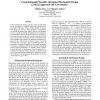Free Online Productivity Tools
i2Speak
i2Symbol
i2OCR
iTex2Img
iWeb2Print
iWeb2Shot
i2Type
iPdf2Split
iPdf2Merge
i2Bopomofo
i2Arabic
i2Style
i2Image
i2PDF
iLatex2Rtf
Sci2ools
127
click to vote
AAAI
2010
2010
Computationally Feasible Automated Mechanism Design: General Approach and Case Studies
In many multiagent settings, a decision must be made based on the preferences of multiple agents, and agents may lie about their preferences if this is to their benefit. In mechanism design, the goal is to design procedures (mechanisms) for making the decision that work in spite of such strategic behavior, usually by making untruthful behavior suboptimal. In automated mechanism design, the idea is to computationally search through the space of feasible mechanisms, rather than to design them analytically by hand. Unfortunately, the most straightforward approach to automated mechanism design does not scale to large instances, because it requires searching over a very large space of possible functions. In this paper, we describe an approach to automated mechanism design that is computationally feasible. Instead of optimizing over all feasible mechanisms, we carefully choose a parameterized subfamily of mechanisms. Then we optimize over mechanisms within this family, and analyze whether a...
Related Content
| Added | 29 Oct 2010 |
| Updated | 29 Oct 2010 |
| Type | Conference |
| Year | 2010 |
| Where | AAAI |
| Authors | Mingyu Guo, Vincent Conitzer |
Comments (0)

